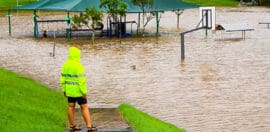‘Like fixing a bullet wound with a bandaid’: Environment left high and dry in budget

12 May 2021 at 11:38 am
The environment has emerged as one of the biggest losers of this year’s budget
With no direct funding for renewables, and all hopes pinned on a gas-fired recovery, environmental advocates say this year’s budget will push the country deeper into the climate crisis.
In his budget address, Treasurer Josh Frydenberg said that the government’s approach to helping the country meet international climate targets would be “practical” and “technology-focused”.
“Technology not taxes,” Frydenberg said.
But while the rest of the globe has gone down the renewables path to mitigate the impacts of climate change, Australia is doing something altogether different, a move that has left environmental and conservation groups reeling.
On Tuesday night, Frydenberg unveiled a $1.2 billion package for low emissions technology innovation.
This will see $565.8 million to establish international partnerships on practical low emissions projects; $275.5 million to support up to four additional hydrogen hubs; $263.7 million to develop Carbon Capture Use and Storage (CCS); and $59.6 million to support a National Soil Carbon Innovation Challenge and trial new agricultural feed technologies that reduce emissions from livestock.
Dr Nikola Casule, Greenpeace Australia Pacific head of research and investigations, told Pro Bono News that this spending package was merely the government “putting on a bit of a show”.
“The government seems hell-bent on funding everything but proven, existing zero emissions technology like wind and solar,” Casule said.
“And these are the technologies key to tackling climate change.”
Gas-led recovery leaves advocates fired up
The $58.6 million investment in key gas infrastructure projects has been slammed by environment groups.
The money will go towards storage facilities, the expansion of gas pipelines, gas supply hubs and import terminal projects across the country.
National director of the Australian Youth Climate Coalition, Alex Fuller, said that young people would be paying the bill of this budget for decades to come.
“Young people deserve a fighting chance for a safe climate future: a gas-led recovery will intensify the climate crisis and endanger our future, while forcing us to pay the bill,” Fuller said.
The Australian Conservation Foundation’s economy and democracy program manager, Matt Rose, said that subsidies for the gas industry flew in the face of climate science.
“It further demonstrates to the world that despite shifting global trends Australia remains a climate laggard,” Rose said.
Casule added that investing in gas didn’t make any economic sense.
“Investing further in gas risks locking in huge investment losses, stranded assets and will continue to drive the climate crisis,” he said.
“The budget should not be using public money to pay for climate-wrecking fossil fuel infrastructure – it should be used for funding clean and safe renewable energy instead.”
Failing to tackle the root cause
A $100 million package to protect oceans, and $209.7 million to establish a service to increase the government’s capacity to predict and prepare for extreme weather events has also been criticised by advocates, who said that while funding was always welcome in these areas, it was failing to tackle the root cause of the problem.
“If somebody kept throwing their garbage on your front lawn and you kept paying someone to clean it up for you, wouldn’t you prefer to just go and talk to them and not get them to do it in the first place?” Casule said.
“No amount of adaptation and resilience measures will take the place of real action on climate change, which is phasing out fossil fuels, scaling up renewable energy, and reaching net-zero emissions by 2035.”
He also added with climate change the biggest threat to our oceans, the money was nothing but “a bandaid for a bullet hole”.
“We know that if we get to two degrees of warming, 99 per cent of the coral in the Great Barrier Reef will be dead,” he said.
“And the only way we can stop that if we stop burning fossil fuels, which this budget does nothing really to address.”
A missed opportunity
Frydenberg did make mention of the fact that Australia had the highest uptake of rooftop solar in the world, and committed $30 million over the next year for a big battery and microgrid project between Katherine and Darwin in the Northern Territory.
But Kane Thornton, the CEO of the Clean Energy Council, described this lack of spending on clean energy projects as a “missed opportunity” to build the country back better.
“A clean recovery from COVID-19 could have delivered over $50 billion of investment, more than 30,000 MW of capacity in renewable energy and more than 50,000 new jobs in constructing these projects, along with many more indirect jobs, revitalising economic activity in regional and rural communities across Australia,” Thornton said.
Casule added that while many private and community-based renewable energy projects were getting off the ground, this budget did nothing to help the burgeoning industry expand.
“We know that solar in particular is incredibly popular and then there are community-based renewables projects done through a kind of collective or other types of mechanisms that are springing up around the country,” he said.
“But they need policy certainty and they need policy support so that those investments can happen.”







